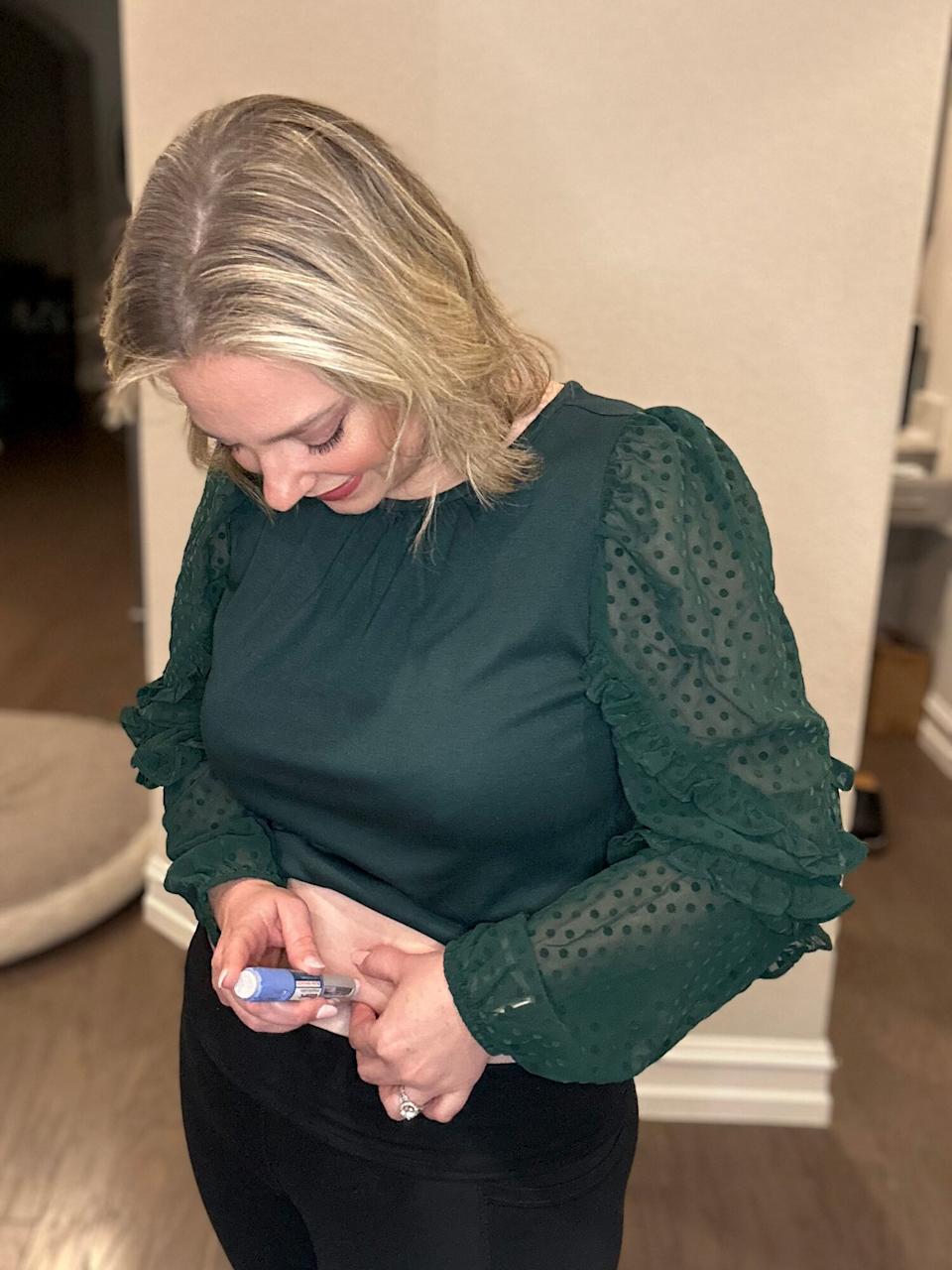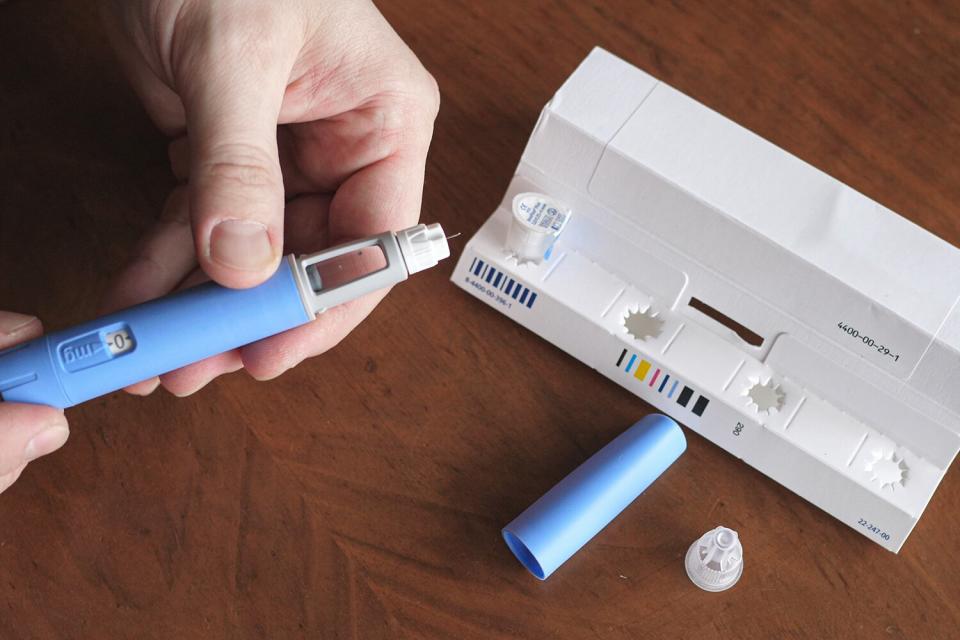Texas Mom Shares Experience Using Ozempic for 1 Year: 'It's More Complicated Than People Realize'
Natasha Robinson has long struggled with high glucose, insulin and A1C levels, which made her gain weight and become extremely fatigued. For several years, the 37-year-old from Dallas was taking diabetes drug metformin but saw no progress. So as someone who works in higher education and has in-laws who are pharmacists, Robinson took matters into her own hands and did research for better alternatives.
She ultimately came across Ozempic and suggested it to her doctor.
Ozempic is an FDA-approved prescription medication — taken by injection in the thigh, stomach or arm — typically used to help lower blood sugar in people with Type 2 diabetes. It's the brand name for semaglutide, which stimulates insulin production and also targets areas of the brain that regulate appetite, according to the FDA.
With approval from her doctor, Robinson started taking Ozempic in January 2022 and is now opening up to PEOPLE about the reality of taking the drug for the past year.
"I was a little nervous, to be honest, because I don't like needles. So the idea of actually giving myself an injection was pretty scary," she tells PEOPLE. "But I started the medication to try to get my body to do what it was supposed to be doing — properly use the insulin that my body was creating."
RELATED: Are Ozempic and Wegovy Safe? All About the Diabetes and Obesity Drugs

Natasha Robinson
Taking the medication was quite the adjustment for Robinson. Early on, she dealt with a lot of nausea — a common side effect of Ozempic. However, the side effects lessened as the months went by.
For more on Ozempic, listen below to our daily podcast PEOPLE Every Day.
"The nausea was pretty rough at first," she explains. "I always take my injection at night, and by about midday the next day, I would start to feel really tired and nauseated. That would last for maybe two days and then I would feel much better and actually get a little bit more energy than I had before."
"Now, I'll have a little bouts of nausea, but it's certainly not anything like it was for that first month where I would feel consistently nauseous for a number of days," she adds.
Robinson also noticed that, although the number on the scale wasn't her concern, she started losing weight after about a month on the medication.
"I noticed right away that my cheekbones were showing a little bit more," she explains. "One morning I actually woke up and told my husband, 'Do I have bruises?' Because I had this little area that my cheeks were showing and it looked like little bruises. That was really my first indication that something was changing."
Robinson's change in her face could be the result of another common side effect, dubbed "Ozempic face," where the weight loss deflates key areas of the face and volume is lost.

Natasha Robinson
By October, the mom of two dropped 52 lbs. and her health had improved significantly in the areas her doctor hoped.
"My blood work really shows a major shift in markers for inflammation and my insulin and glucose," she says, noting that she has a lot more energy. "I feel so much better than I did and I just didn't realize how difficult life was becoming before."
RELATED: Ozempic Rebound Is Real: Doctor Says Weight Gain Can Be 'Devastating' After Stopping
Despite the progress with her health, there is one lingering factor that worries Robinson: the cost of Ozempic.
Robinson is currently spending $24.99 per month on Ozempic, which she says she has no problem with. However, without her monthly coupon, her prescription would cost $175 per month, and without her insurance coverage, she would be spending over $1,000 per month.
There are currently no generic forms of Ozempic and the average retail cost without insurance can range from $1,205 to $1,368.
Never miss a story — sign up for PEOPLE's free daily newsletter to stay up-to-date on the best of what PEOPLE has to offer, from juicy celebrity news to compelling human interest stories.

Getty
Robinson says she's "terrified" of the possibility of not being able to get her medication anymore as her insurance company will soon require a prior authorization for Ozempic — an issue many others are also facing.
"It's a lifelong medication. Your body doesn't just suddenly remember how to use insulin properly or how to become more insulin sensitive. So I was fully expecting to be at a lower dose for my whole life," she says, noting that she's already thinking of ways to get her medication if something happens.
"I would probably order it from Canada if my doctor were willing to write a prescription for me," she admits. "Because $250 or $300 is a lot more reasonable than $2,000, or whatever high amount it is without the coverage."
Robinson explains that although there are people who have taken Ozempic because of an online fad, she and many others rely heavily on the medication.
"I think the more that we talk about obesity, diabetes, insulin resistance, and PCOS, the more people learn that it's not always that you're being lazy," she says. "There's this misconception that you're being lazy if you have health problems and you can't lose weight. But sometimes it's a lot more complicated than people realize."
Robinson, who has also been sharing her experience on social media, tells PEOPLE it's important that her followers learn the options available for their medical needs and feel comfortable creating a plan with their doctors that will best improve their health.
She adds that despite some misinformation that can come from the recent trends involving Ozempic, she's glad these conversations are being held because they can help other people like herself. Ozempic — and other similar injections like Wegovy and Mounjaro — has recently been trending on social media and in Hollywood circles as some people have used it for weight loss, even when not medically necessary.
"Celebrities aren't really helping things when they speak on medications that they took for a short period of time or accidentally took — the misinformation isn't great — but the fact that we're able to have more conversations about these medications, I don't think that's a bad thing," Robinson says.

 Yahoo News
Yahoo News 